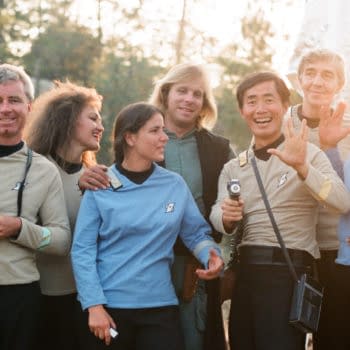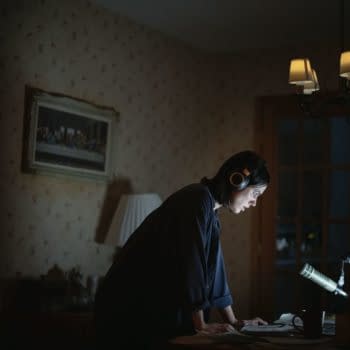Posted in: Movies, Recent Updates | Tagged: Brigitte Helm, fritz lang, Germa cinema, Giorgio Moroder, Gusac Frolich, HRL, Lauren Looks Back, metropolis, sci-fi, Thea von Harbou
Lauren Looks Back: Fritz Lang's Expressionist Epic 'Metropolis'
Metropolis is, without a doubt, my favorite movie. The 1927 Fritz Lang film has been influencing pop culture for decades, and is still one of the most celebrated films of all time.
If you've never seen this film in its many versions, please please please stop reading this and look the film up on Netflix. It should still be there. It's an amazing silent film. If you're going to just keep reading (OK, I guess) here's a quick synopsis from IMDB:
"In a futuristic city sharply divided between the working class and the city planners, the son of the city's mastermind falls in love with a working class prophet who predicts the coming of a savior to mediate their differences."
That's a very simple summary for a film that includes robots taking on human disguises, a city that's falling apart, and a mad scientist. There's a lot going on in this film, but it's played out stunningly. Lang and his wife, Thea von Harbou, co-wrote the screenplay together, while Harbou was tasked to write a novel to accompany the movie. The book is not as grand at the movie, but it's still important to the overall film. The novel had been serialized over several months in Illustriertes Blatt to build up the public's excitement. The film ran for a total of 210 minutes opening night, which would sadly be the last time anyone saw a complete version of Metropolis — the film was cut down significantly after opening night.
But before we get ahead, lets look at what drove Lang to create the film. In 1924, while overlooking the New York Harbor, Lang found great beauty and inspiration from the neon-lit skyline, which would ultimately become the backdrop to Metropolis. In Lang's own words, published in Cahiers Du Cinema in 1965:
"You know, Metropolis was born from my first sight of the New York skyscrapers in October 1924, before I went to Hollywood where UFA was sending me to study American methods of production. It was terribly hot at that time. While visiting New York I felt it was the crucible of the multiple and confused human forces, with blind men scrambling around in the irresistible desire to exploit one another, thus living in perpetual anxiety. I spent an entire day walking the streets. The buildings seemed to be a vertical veil, very light and scintillating, a luxurious backdrop suspended from the gray sky to dazzle, distract and hypnotize. At night the city gave only the impression of living; it lived as illusions do. I knew that I must make a film of all these impressions."
New York is a city where anything is possible — a feeling Lang conveys through the characters of Freder (Gustav Fröhlich) and Maria (Brigitte Helm), but more so in Maria, who wants her world and Freder's world united as one. Lang created two worlds (above and under) to show the class differences, and ultimately class wars, between Freder, who grew up with everything he could ever dream, and Maria, who grew up with the workers below the city. Freder falls for Maria instantly, and runs after her in the city below.
It's safe to assume that until that point in his life, Freder had never seen manual work. We can see that it's hard for him to understand why the great men above ground (his own father, being the mastermind behind Metropolis) would allow the suffering of these people below. Lang created a hellish work scene, where men work to their deaths. It's probably a good time to say this now: a lot of these images have a striking resemblance to things that happened during World War II. This film was a hit with the Nazi regime, as Hitler and a group of his closest cohorts were all entranced by the movie. Harbou was an ardent supporter of the Nazi party, but Lang was not. It is important to note that Lang (a Jew who was granted immunity by the Nazi party) fled to America during WWII, for very obvious reasons. This also lead to him and Harbou divorcing.
Lang himself was a perfectionist. He required Helm to wear the android costume for hours, despite the costume being remarkably hot and uncomfortable. The movie cast thousand of extras — 1,000 bald men for the Tower of Babel scene (which after shooting the scene, he sent the film through an optical multiplier to get the 4,000 he wanted), 1100+ women, 25,000+ men, and 750+ children all made up the cast. Supposedly it wasn't hard finding malnourished children to use for filming, as Germany was economically in trouble. He was rather hard on (if not abusive to) his cast. Helm suffered from cuts, over heating, and bruising from wearing the android costume, and even fainted at one point while wearing it. In her own words, from Cinefantastique:
"The night shots lasted three weeks, and even if they did lead to the greatest dramatic moments–even if we did follow Fritz Lang's directions as though in a trance, enthusiastic and enraptured at the same time – I can't forget the incredible strain that they put us under. The work wasn't easy, and the authenticity in the portrayal ended up testing our nerves now and then. For instance, it wasn't fun at all when Grot drags me by the hair, to have me burned at the stake. Once I even fainted: during the transformation scene, Maria, as the android, is clamped in a kind of wooden armament, and because the shot took so long, I didn't get enough air."
The creation and science behind a lot of the scenes and special effects in the film is worthy of its own article, but to surmise, Lang was crafty with over exposures and forced perspective. The Smithsonian ran a fantastic article on the science behind Metropolis, and it is absolutely worth your time to read. Wired also has scans from a 1927 movie program, which also talks about how the film was created.
However, it feels as though his insane vision will never be fully appreciated. As I said earlier, the film was cut significantly both in Germany, and the US. In Germany, Universum Film ordered the run time to be shortened to 114 minutes, as they wanted to show the film multiple times per day to try and recoup their money spent on the film. When Paramount got it for American distribution, they cut the film back even further. The original 210 cut is still lost (if it wasn't destroyed), and there has been several versions of varying lengths released.
Most Americans are familiar with the Giorgio Moroder version, which runs at just 83 minutes, as he took away the inter titles. He also included a pop/rock soundtrack, which featured artists such as Freddie Mercury, Loverboy, and more. This version isn't bad, but dropping the original score takes away from the feel of the film. There was another attempt at a restored version shortly after, which brought the run time to 118 minutes.
However, it wasn't until 2008 that an almost-complete copy was discovered in Argentina. The print had been in circulation since 1928, and through the years landed in the archives at the Museo del Cine. The film was thus restored as best as it could be, giving us the most complete copy of Metropolis we have to date. We still have some scenes missing, but the almost-restored version gives us better narrative and more explanation of Josaphat, the Thin Man, and 11811. I was lucky to see this version at The Senator Theater, which added to the drama of the film — the theater opened in 1939 and still boasts some of its original art deco designs.
For years, there has been talk of a remake coming. The most recent rumor is that Sam Esmail (Mr. Robot) would like to turn it into a miniseries. I'm intrigued at seeing a miniseries of the film, but at the same time, why? The original is so ahead of its time and influenced a great deal of pop culture that a remake is unnecessary. I understand that not everyone is a fan of silent movies, but this is arguably one of the most important films in the world. I could spend hours talking about different aspects of the movie —there's frankly so much I didn't touch. If you haven't seen Metropolis yet, do so. If you're a fan of good filmmaking and sci-fi, Metropolis should be at the top of your list.




















